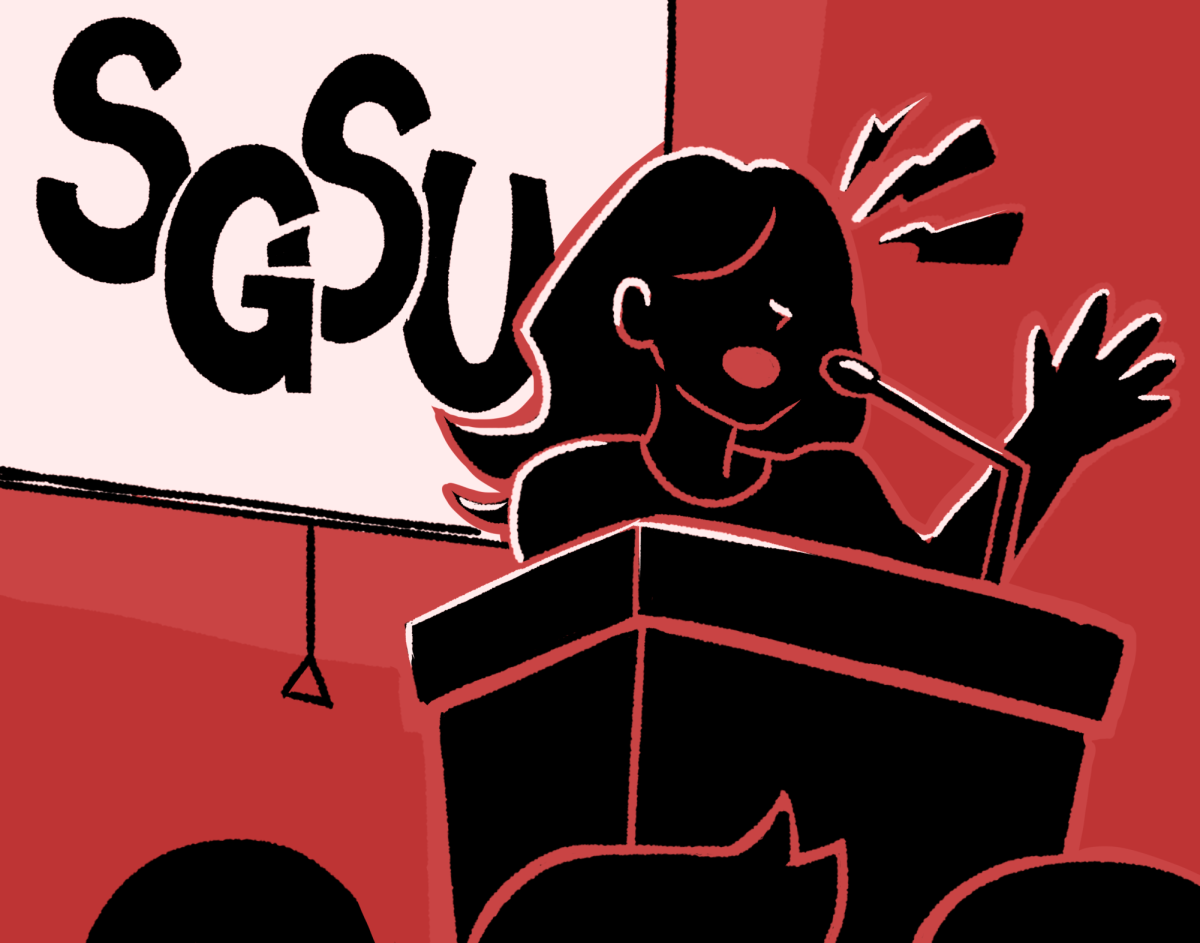Federal laws are often written in an ambiguous manner, allowing each relevant body to interpret them as they see fit—but also allowing for confusion and controversy. Seattle University’s sexual misconduct policy, found in the Code of Conduct, is an interpretation of the Title IX and the Clery Act, and one that is receiving increasing scrutiny from students and faculty.
In the last week, two events held on campus addressed this policy. On March 2, the Seattle U group Reignite the Mission organized a panel with representatives from six social justice movements on campus. It included social work professor Amelia Seraphia Derr, who brought an open letter from the Anthropology, Sociology, Social Work, and Women & Gender Studies departments. The letter was sent on Feb. 1 to Seattle U administration and staff explaining their criticisms of the current sexual misconduct policy. The next day on March 3, Wingmen, a Seattle U group dedicated to increasing sexual assault awareness and prevention efforts especially among men, hosted a workshop on the policy for students, staff and faculty.
“We wanted to foster a space of discussion,” said freshman Michael Clymer, a member of Wingmen. “There’s so much confusion about the policies, and I feel like if you went up to the average student and asked them about the policy, they wouldn’t be able to tell you anything, which I think can be very dangerous.”
Bailey, a survivor of sexual assault who wished to not disclose her last name, transferred to Seattle U because of a bad experience with the reporting process at her previous school. She said that she believes more conversation and awareness would make the process safer and easier for everyone.
“I think that people should just be allowed to talk about it, and it shouldn’t be a dirty thing to talk about,” Bailey said. “There’s a lot of shame involved, and people want to point a finger at someone who did something wrong…but I think that’s the wrong way to approach it.”
Director of Wellness and Health Promotion Ryan Hamachek, who was present at the Wingmen workshop, said that despite the controversy, he believes everyone on campus has a common goal.
“How do we make a better campus, and certainly make sure that survivors are supported, and make sure that everyone has accurate information? I think that’s all of our goals, but we have different ways of going about it,” Hamachek said. “And, the policies are confusing”—which makes it more difficult for everyone to be on the same page.
Currently, a student survivor can receive confidential support from Counseling and Psychological Services (CAPS), the Student Health Center and from Campus Ministry—these services are solely dedicated to supporting the survivor and would not result in any action taken against the perpetrator. If the student wishes to file a report against the perpetrator, they can do so internally through the Title IX Coordinator Andrea Katahira, or externally through the Seattle Police Departmen—or, the student could choose to do both.
Where controversy arises, however, is in the instance when a student seeks support from university employees outside of CAPS, the Student Health Center or Campus Ministry—such as Resident Assistants, professors, Public Safety officers or employees, or on-duty student Desk Assistants. These individuals are considered responsible employees (also often referred to as mandated reporters) and are required to report the incident to Katahira, the Title IX Coordinator, so that she can follow up and make sure the student is aware of the available resources and
reporting options.
Title IX does not explicitly state who must be responsible employees. At Seattle U, the title is applied to all faculty and some student employees such as Resident Assistants, on-duty housing Desk Assistants, and on-duty Public Safety student employees. Many believe the administration should reconsider this interpretation.
In the letter delivered to the President and other administration members on Feb. 1, the Anthropology, Sociology, Social Work, and Women & Gender Studies faculty explained their position that this policy is harmful and should be changed.
The letter referenced a 2012 report from the American Association of University Professors, which “declared that faculty members should not be mandated reporters due in part to the chilling effect that status might have on communication with students. Chilling effect refers both to the intellectual domain when these matters are relevant to course content, and to the psychological domain because faculty are…often the first choice for students who disclose.”
Title IX Coordinator Andrea Katahira said that she and other staff members are reviewing the letter and plan to seek further dialogue with the faculty before responding.
In response to this part of the letter, Katahira said in a written statement, “What seems to be of core concern is student survivors being ‘forced into a post-assault process not of their choosing’…In fact, students are not forced into a post-assault process not of their choosing. Student survivors retain agency to decide what steps, if any, they want to take, and when.”
According to Hamachek, the reason Seattle U has “cast the net wide” in our interpretation of responsible employees is due to a policy guideline from the Department of Education stating that anyone “whom a student could reasonably believe has this authority or duty” should be a responsible employee.
“And that’s the nuance,” Hamachek said. “If ‘Student X’ says I went to that person because I thought they could do something, then that person is a responsible employee.”
After the Wingmen event, Penney said that she agrees with the faculty letter that fewer people on campus should be responsible employees. She especially isn’t convinced that student survivors would expect student employees to have the authority to report.
“That’s just an interpretation in itself and it could be taken a different way,” Penney said. “I think there’s a difference in seeing someone who can report your experience for you and someone you’re just looking to confide in.”
Another issue raised by the faculty and students at the Wingmen discussion on Thursday was a belief that training is inadequate for many student employees, faculty and staff who are responsible employees.
Currently, an information sheet is provided to faculty and staff on how to respond to an incident of sexual misconduct that they become aware of. The sheet says that they must first and foremost “provide the student with non-judgmental support AND ensure the student is safe,” then “explain your reporting duties AND provide the student with resources,” and finally contact the Title IX Coordinator within 24 hours. However, according to the faculty letter, most receive no actual training.
“The vast majority of faculty, staff and students made into mandatory reporters by this policy have no training whatsoever in responding to sexual assault,” said the faculty letter. “Students who are victimized become susceptible to being traumatized again as a result of reporting to someone who responds poorly.”
In some cases, the university does conduct extensive training on this issue—especially for RAs, who are considered “responsible employees” at all times. According to Hamachek and Resident Assistant Afton Rodriguez, the training has increased in recent years. The iLead program for student leaders, which began three years ago, spends a significant amount of time training students to respond to sexual misconduct. In their training before the school year, RAs also spend a few days learning their responsibilities according to Title IX.
“We focus on ‘up not out,’” Rodriguez said. “So if you decide after I tell you that this is my obligation within my job and you still decide that you want to go ahead and tell me what’s going on, the information goes to my direct supervisor. It’s kept isolated in a way to make sure that we’re protecting identities of people involved, but also to make sure that the integrity of that information is sound.”
RAs are also required every year to go through the Think About It training required for all incoming students, and they have follow-up trainings throughout the year.
For other student employees such as Desk Assistants and part-time Public Safety employees, training is less extensive, partly because their “responsible employee” status only applies when they are on-duty.
“Our full-time staff go through really extensive training on sexual assault and reporting, and our part-time staff are really observe and report,” said Associate Director of Public Safety, Craig Birklid. “They are just going to have a lesser level of training. Their main point if they learned about something like that is to report it to a full-time staff person so that it could be engaged.”
The Think About It online course is the main resource for the general student population, though the school has also been increasing its prevention efforts through programs like Green Dot, a bystander-intervention training. The Health and Wellness Crew and the Wingmen are groups created out of the office of Wellness and Health Promotion also dedicated to addressing this issue. But at the workshop last Thursday it was clear that some students believe more conversations are necessary—both to increase awareness and to reevaluate our current policies.
In their letter, the faculty suggested developing transformative justice options, which could allow the survivor to choose to pursue restorative and reconciliatory measures rather than only having punishment options for the perpetrator.
From her experience at her last school, Bailey said that transformative justice measures could have been helpful by removing fear of punishment from the situation.
“If we had taken the concepts of good and bad out of the equation, we would have seen that there were deep-seeded issues that he didn’t understand.”
After the Wingmen workshop on Thursday, Clymer believes that the movement towards increasing awareness and possibly even re-evaluating policy is gaining momentum. And it’s well-timed, considering April is Sexual Assault Awareness Month, and there will be plenty of opportunities for students to join the conversation such as Take Back the Night on April 7.
“I think we need to take advantage of the fact that it’s on the mind of so many administrators and so many faculty members right now,” Clymer said. “And so we need to start that discussion with students, so that it’s campus-wide to the fullest extent.”
Madeline may be reached at [email protected].













